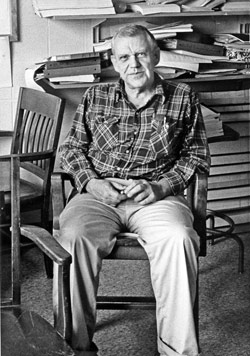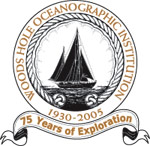This is an archived site. This site is no longer being maintained or reviewed for broken links.
Employee Portrait Gallery—Henry Stommel
 |
|
|
Henry Stommel, pictured in 1979 in his Clark lab office, was described as a “prodigious man” in a 650-page volume that celebrated his 60th birthday. Evolution of Physical Oceanography: Scientific Surveys in Honor of Henry Stommel, edited by Bruce Warren and Carl Wunsch (MIT), lauded Stommel’s immense influence on the development of physical oceanography. “He is a theorist of extraordinary creativity,” they wrote,” an astute observer willing to spend weeks at sea, and an ingenious laboratory experimentalist of the sealing-wax-and-string school, and he has been an inspiring, if sometimes bewildering, teacher to a generation of graduate students.” (Photo by Vicky Cullen, WHOI)
|
|
Hank Stommel was in his second year as an astronomy graduate student at Yale University when he came to WHOI in 1944 as a way of serving his country without going to the battlefield. From then on, he was affiliated with and lived near the Institution until his death in 1992, although he held faculty positions at Harvard from 1960 to 1963 and MIT from 1963 to 1978, when he rejoined the WHOI staff. In their introduction to a 1992 special Stommel issue of Oceanus magazine, Jim Luyten and Nelson Hogg wrote, “For most of the past 50 years, Henry Melson Stommel was the most influential figure in oceanography. Through his simple brilliance, his personal magnetism, and his great zest for life, he inspired legions of oceanographers.”
Colleagues tend to describe a scientific conversation with Stommel as a situation where they had to “hang on” to follow his intellectual gymnastics. Luyten lists three essential Stommel qualities: insatiable curiosity, extraordinary intuition (he was relentless in stripping problems down to their most elemental levels), and the ability to visualize physical processes fully in three dimensions. Hank was also well known for his generosity with ideas—he sparked many individuals’ research directions and initiated a number of collaborative oceanographic programs, both large and small.
Most facets of modern physical oceanography benefited from Stommel’s insights, and he received many awards for his work. He is probably best known for major steps taken in the 1940s and 1950s toward understanding the general circulation of the ocean: He determined that the rotation and curvature of the earth are essential factors producing intense currents on the western sides of all oceans, and that changes in density caused by cooling and evaporation at the sea surface can be responsible for deep flows in the ocean. With these factors accepted, other theories about global circulation began to fall into place, and Stommel worked enthusiastically with a broad range of colleagues for the rest of his life to articulate them.
Three volumes of Collected Works of Henry M. Stommel, edited by Nelson Hogg and Rui Xin Huang, include an unpublished autobiography that includes these words: “Above all I must thank my lucky stars for being born in this century and this country where the public has taken such a benevolent interest in sponsoring scientific research. . . . The freedom to work in science on one’s own, with congenial colleagues, unfettered by supervision, with a scientific problem in one’s mind when he goes to bed and awakes next morning, to be able to give undivided attention to unraveling some puzzle of nature is a privilege beyond compare.”
[back]

